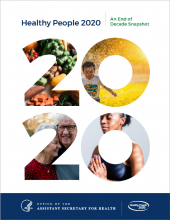By ADM Brett P. Giroir, MD, Assistant Secretary for Health
“Healthy People 2020: An End of Decade Snapshot” — a high-level report summarizing the nation’s achievements in meeting the Healthy People 2020 objectives — is available now. The Healthy People initiative helps to improve the health of the nation by identifying objectives, setting targets, and monitoring the nation’s progress towards achieving established goals. Through this and future reports on Healthy People 2020, we will examine the data collected over a 10-year period on public health priorities, threats, and challenges to identify successes and areas for improvement.
One notable achievement described in the snapshot is that more than half of the 985 Healthy People 2020 trackable objectives — that is, objectives with a target, a baseline value, and at least one follow-up data point collected during the decade — improved, or met or exceeded their targets. This report shows that 54% of the Healthy People 2020 high-priority health issues, known as Leading Health Indicators (LHIs), improved, or met or exceeded their targets.
The report also identifies disparities in how specific populations progressed towards achieving Healthy People 2020 targets. Understanding where there are differences in health among populations helps us to better understand and ultimately address social determinants that may prevent populations from attaining the highest level of health.
For example, the following disparities from the snapshot illustrate how income, education, and disability have the potential to impact health:
- Rates improved, or met or exceeded targets, for 64.8% of trackable objectives with data for people with high family incomes (above 600% of the poverty threshold), compared to 38.4% of trackable objectives with data for people with poor family incomes (living below the poverty threshold).
- Rates improved, or met or exceeded targets, for 69.6% of trackable objectives with data for people with advanced degrees, compared to 38.6% of trackable objectives with data for people with less than a high school education.
- Rates improved, or met or exceeded targets, for 47.2% of trackable objectives with data for people without disabilities or activity limitations, compared to 32.5% of trackable objectives with data for people with disabilities or activity limitations.
The achievements outlined in this snapshot are a result of actions at the federal, state, and local level. Throughout the decade, ODPHP collected stories from across the nation — identifying programs, interventions, and policies that helped move us closer to achieving Healthy People 2020 targets and goals. These stories focused on efforts of community-based organizations, educational institutions, and government agencies to improve specific health outcomes, address health disparities, coordinate patient care, and more.
As we transition to Healthy People 2030 targets and goals, we must leverage our findings from the previous decade to help bring about the change we want to see in the new decade. As OASH continues our efforts to lead America to healthier lives, communities, states, and organizations can look to Healthy People for data, information, and tools to drive action.




